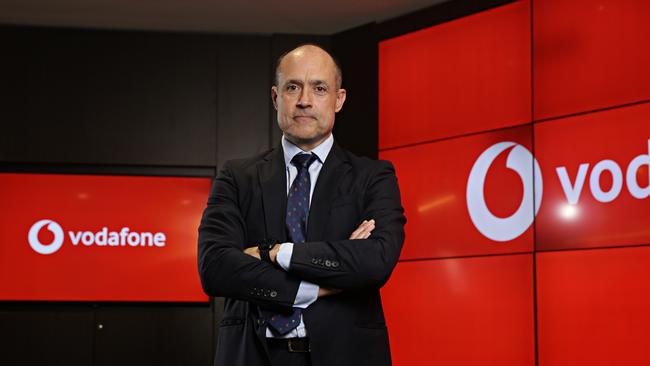TPG Telecom’s half-year profit falls 40pc, targets $20m in cost cuts
Australia’s third biggest telco hopes to limit job losses to 120 as it cuts costs and faces ‘intense competition’ in the NBN broadband market and smartphone war.

TPG Telecom chief executive Inaki Berroeta expects to limit redundancies to 120 roles as the company embarks on $20m worth of annual cost cuts.
Mr Berroeta announced the job losses on Friday but said he “didn’t anticipate anymore”, unlike the widespread redundancies at Telstra and Optus. TPG’s half-year profit fell 40 per cent to $29m – a fall Mr Berroeta flagged earlier in the year – citing increased investment in its network, higher financing costs and “intense competition” among NBN retailers.
“We are a company that has traditionally been managing cost quite strictly. We had to make the difficult decision to reduce the number of roles, the reduction is an order of magnitude less than we are seeing at our competitors,” he said.
“We don’t anticipate any more reductions than what we have done this year to be able to compensate for the incremental cost – not just on people cost but also on many other lines, whether it’s electricity or licensing etc. Inflation is across the board but it’s smaller than what we have seen in the market with our competitors.”
Telstra is sacking 2800 staff, or 9 per cent of its overall workforce, as part of $400m in cost cuts. Optus, meanwhile, axed its entire smart home installation business earlier this year, making almost 200 people redundant in its latest round of job cuts.
TPG shares jumped 8.3 per cent to $4.96 on Friday, with analysts saying its profit slightly exceeded expectations.
It comes amid fierce competition between the telcos, with Mr Berroeta taking aim at Telstra over “aggressive discounting” on smartphone handsets as part of an effort to lure more mobile customers.
Telstra has slashed the price of its handsets, selling the Google Pixel 9 at less than half its cost among other steep discounts. Mr Berroeta said the smartphone war was unsustainable, saying those “promotions will have to be justified”. But he expected it to ease in the coming months after Apple releases its widely anticipated next iPhone model.
“What we have seen is a bit different from previous years with a significant level of subsidy on handsets. Obviously when you have such a level of discounting in the market, it does introduce a level of distortion. We will see how that plays out.
“At the end of the day, those things aren’t usually sustainable. It’s always been a competitive market and I think that you need to look at the performance a bit more on the longer-term.”
Mr Berroeta declined to say whether TPG would make further price increases after it hiked the average plan cost of its flagship Vodafone service by $4 a month in March and faced a near 27 per cent increase in financing costs.
“We never discuss any future changes on our pricing. The other thing is that … you need to really consider what a price rise is.
“If you think that ultimately what consumers are using is an amount of data on their mobile plan, the price per data consumed continues to be deflationary for many, many years, no other industries doing that.
“Mobile, as a product, is delivering roughly a 30 per cent incremental consumption by consumers. I don’t think there is any other industry that is delivering a 30 per cent-plus increase in consumption with really moderate cost incrementals to the customer.”
TPG grew its mobile business by 64,000 customers, bringing the total to 5.52 million. This growth came from a new mobile virtual network operator contract with Lyca Mobile, which added 98,000 customers.
Average revenue per user (ARPU) in its mobile business increased 4.2 per cent to $34.40 per month. Mr Berroeta said plan refreshes across its premium postpaid services drove a 6.1 per cent increase in Postpaid ARPU to $47.30 per month.
Mobile revenue jumped 7.2 per cent to $1.12bn in the half-year, with the gain in mobile customers offsetting a 3.5 per cent slump in its fixed service revenue, which includes data and internet. Overall revenue for the half-year was flat at $2.7bn.
TPG lost about 30,000 customers in its fixed business, with total numbers now at 2.1 million. Mr Berroeta said the company was focused on “improving margins amid aggressive competition from smaller and non-telco NBN providers”.
“We are focused on strategy delivery as we look to progress our proposed regional network sharing arrangement with Optus, complete the strategic review of our fibre infrastructure assets and prepare to start delivering customer benefits of business simplification in FY25.”
TPG is awaiting Australian Competition and Consumer Commission approval on a $1.6bn network sharing agreement with Optus.
“We are pleased the ACCC process to review our regional network sharing agreement with Optus will soon complete and we look forward to receiving its decision,” Mr Berroeta said.
Mr Berroeta said TPG’s national 5G rollout remains on schedule, with more than 3400 mobile sites upgraded to 5G. Upgrades to the rest of the company’s metropolitan sites are scheduled to be complete by the end of 2026.
Net debt was $4.1bn, an increase of $151m on the previous corresponding period. On an adjusted basis – which is how TPG calculates its dividend – profit fell 13.2 per cent to $264m.
It will pay an interim dividend of 9c a share, 87 per cent franked, on October 11.
Mr Berroeta said TPG was “tracking towards the mid-point” of the FY24 earnings before interest, tax depreciation and amortisation guidance of $1.95bn to $2.03bn, excluding material one-offs.




To join the conversation, please log in. Don't have an account? Register
Join the conversation, you are commenting as Logout